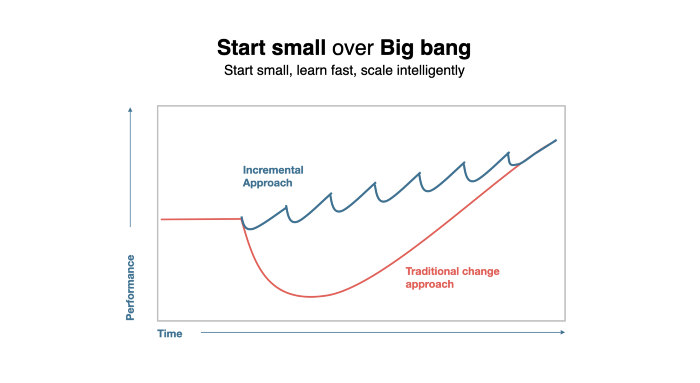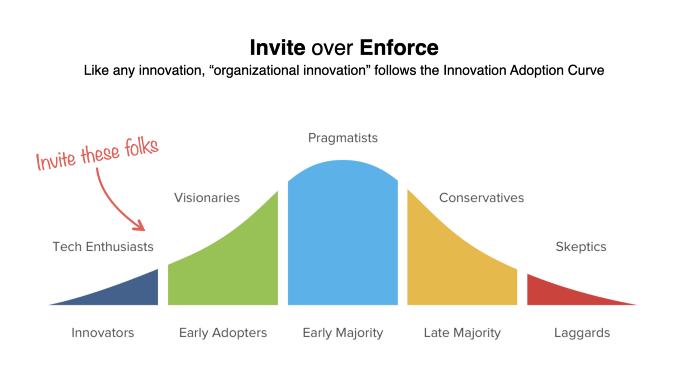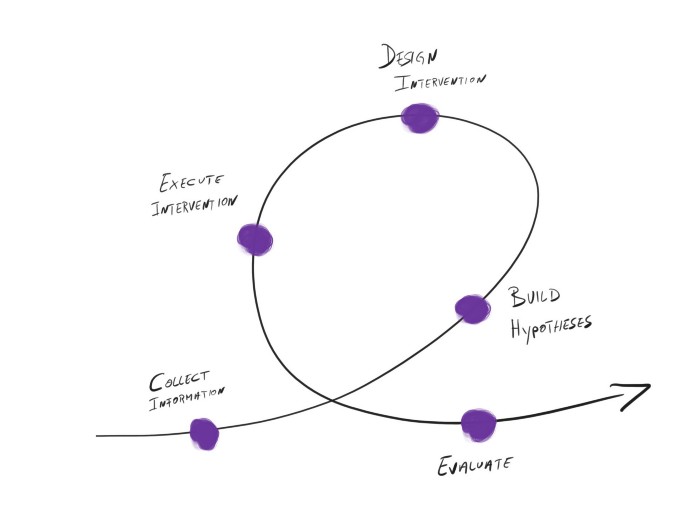Get your Team to Focus on Making Progress with the 90/21/7 Method
Last week I wrote about applying the five principles of human-centered ways of working to teams. This week I’ll illustrate a simple yet very...
3 min read
Dr. Marc Sniukas
Feb 7, 2023 12:00:00 AM
You can’t transform into new ways of working by applying the traditional change management principles.
After all, they are based on the very same principles you’d like to change. So instead, new principles need to be applied to the transformation itself.
This article examines the fundamental principles of how to transform and reinvent your ways of working so that you can become an adaptable, agile organization with high-performance teams.
Instead of the traditional change management method of focusing on interventions, procedures, and processes to change people’s minds and behaviors, you should focus on business outcomes and creating value.
Applying the first principle of human-centric ways of working, start by defining the mission. What’s the purpose of the transformation? What are the outcomes you want to achieve?
For example:
Support your teams to achieve these outcomes while applying new ways of working, and let them decide which processes and procedures are most appropriate for doing so.
Next, apply the second principle of human-centric ways of working and focus on making progress and achieving the defined outcomes.
While implementing change, your business should focus on scaling intelligently by applying an incremental change approach. This approach will allow your team and organization to develop over time by changing components in increments and making small alterations.
The benefits of the incremental change approach are that you can start finishing right from the beginning. It delivers results faster than a big bang approach that only produces results further down the line. As Malcolm Gladwell suggests, small incremental changes will build and reach a point where they tip to unleash a flood of success.
Focus on outcomes and validate your hypotheses about what will deliver value. Focus on the most valuable things you can do.
Learn and change mindsets on the way. As most psychologists will tell you, it’s easier to behave your way into new ways of thinking than it is to think yourself into new ways of behaving.
So, start small by focusing on one team or department and learning what works well. Once you find what works best, scale-up.

Like any innovation, “organizational innovation” follows the innovation-adoption curve. Instead of concentrating on skeptical or conservative people, focus on the enthusiasts and invite people interested in what you are offering. Go the path of least resistance. You will find folks who would like to change things in any organization. When these people produce provable outcomes, you can scale up and create more momentum by including more teams.
In his book, Stephan Heiler outlines how he tried to start the transformation process with the leadership team, who wasn’t interested in a transformation towards new ways of working and self-management. Finally, after about two years of trying to convince his colleagues, he opened the transformation up by holding a town hall meeting and inviting everybody to participate. That was the beginning of a successful change.

“You need the hierarchy to break the hierarchy.”
Although Stephan’s leadership colleagues were not on board, he was convinced it was the right thing to do as the CEO and owner. Most reports and case studies on successful transformations will tell you that it doesn’t work without leadership commitment. This might also require you to let go of colleagues who are not committed. (By the way, you don’t have to agree to commit!)
Ideally, start with the number one team: the leadership team. Build its understanding of the five principles of human-centered ways of working. Help them define their ambitions and aspirations and identify how new ways of working will add value. By implementing a top-down approach, the executive team can fully grasp why this way of working is required and buy into it before moving to a comprehensive transformation at scale.
Organizational change and transformation are unpredictable. Therefore, it is impossible to plan a new ways of working transformation in great detail from the start. Instead, you need to trust that the best way forward will emerge with time.
This doesn’t mean, though, you should rely on hope, wait and see. Yet, instead of focusing on developing big plans for the months to come, focus on the immediate next step needed to get going, create and keep momentum, and resolve the primary issues in front of you.
The Systemic Loop provides a framework for designing and implementing such next steps:

A comprehensive transformation will eventually touch every facet of the organization, including strategy, organization design, ways of operating, people, and technology. By sticking to the above principles, you will have the toolset and methodology to transform and reinvent your ways of working.

Last week I wrote about applying the five principles of human-centered ways of working to teams. This week I’ll illustrate a simple yet very...

Dramatic changes are currently happening in our working culture. Work from home. Hybrid work. The great resignation. Agile transformations. Purpose...

How could your team design its own new ways of working? What questions to ask? Where to begin?